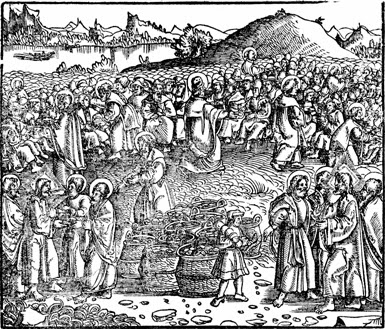What is this among so many?
Aside from the resurrection, the story of Jesus feeding the 5,000 is
the only miracle recorded in all four Gospels. Obviously, the Gospel writers
considered this a significant miracle. We might wonder why. For sheer
eye-popping attention getting I can easily think of a lot more exciting
miracles like the three raising of the dead, the daughter of Jairus, the son
of the widow of Nain, and Lazarus. What about giving the blind sight? Making the lame to walk? The deaf hear?
St. Augustine reasoned
that God’s governance of the whole world is a greater miracle than feeding five
thousand men with five loaves. For he feeds the whole world, from grains
creates whole harvests.
But the explanation of
the preeminence of this miracle is fairly obvious: it is impossible for
Christians to hear the story of the feeding of the five thousand without being
reminded of the Eucharist.
And the reason that
this story is important for us is that it was impossible for the Jews who were
feed that day not to be reminded of the feeding with the manna of the Jews in
the wilderness. This is borne out if you
go on read the rest of the 6th chapter of St. John’s Gospel: “This
is the bread which came down from heaven, not such as the fathers ate and died;
he who eats this bread will live for ever.”
The Gospel this Sunday
is full of clues which link the Eucharist with the manna in the wilderness.
The reason that the
crowd is hungry in the first place is because they have quite literally
followed Jesus nine miles into the wilderness . Jesus like Moses has gone up a
mountain. John mentions the fact that it was at the time of the Passover, when the
Jews remembered that night in which the lambs were sacrificed and the blood put
on the doors to protect God’s people from the angel of death. Phillip
and Andrew murmur like the Jews of old: “Two hundred denarii would not buy
enough bread for each of them to get a little”. "There is a lad here who
has five barley loaves and two fish; but what are they among so many?"
Jesus takes the loaves and fish, give thanks and distributes them, as much as
they wanted and the people ate their fill.
There were some fish, real fish, but fish not born in the
sea but in the bottom of the baskets, with no mother or father, only the
command of Jesus which fished them out of nothing. There was some bread baked by no baker from barley never
grown, cut down and ground at the mill, but brought into being by the words of
Jesus: “make the people sit down.” But
it is real bread which fills human stomachs. Real bread which crumbles and so
must be gathered that nothing be lost.
So it is at every Mass: bread becomes the real
Body of Christ and wine becomes the real
Blood of Christ only because Jesus commands that it be so: “This is my Body and
This is my Blood.”. Yet we must also remember the other circumstances must be reproduced.
We come to Mass
hungry. That is why the Church has always insisted on the fast before receiving
the Blessed Sacrament. But whether we are physically hungry or not we must be
spiritually hungry. Desperate for the food which give Life to the dead. We come weary from the battle with the world, the
flesh and the devil, seeking the protection of the Blood of the Lamb. Every
Eucharist is a night time affair even in the clear brightness of the morning: “the
night in which he was betrayed”. So we come to Jesus with fear, fear of our own
betrayals of Jesus, fearful of those who betrayed us, so that as that prayer of
the Liturgy of St. John Chrysostom says, the Son of God may Receive
me today as a partaker of his mystical
Supper. I will not reveal the mystery to his adversaries. Nor will I give him a kiss as did
Judas. But as the thief I confess him: Lord, remember me in thy kingdom.
That is why the Church
has always commanded us to rejoice on the Forth Sunday of Lent: “REJOICE ye with
Jerusalem: and be glad with her, all ye that love her: rejoice for joy with
her, all ye that mourn for her.” This is
the Jerusalem which according to the first reading is condemned, “exceedingly unfaithful, following all the
abominations of the nations . . . polluted
. . . exiled but also redeemed . We rejoice not in ourselves
but in the abundance of God’s mercy , as St. Paul tells us in the Epistle, the
abundance which not overflows into twelve baskets but the eternal store from
which he feeds the New Jerusalem, the Church, throughout the world. We rejoice in the reckless divine generosity
which takes our all-to-little -what is
this among so many – and makes of it
much-too-much.


No comments:
Post a Comment